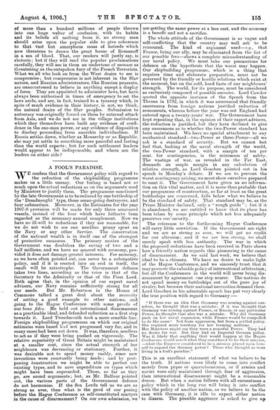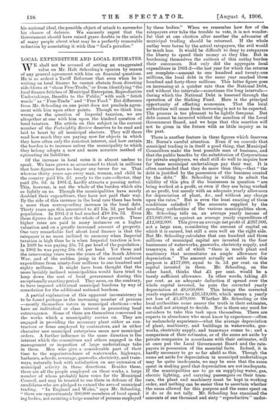A FOOL'S PARADISE.
WE confess that the Government policy with regard to the reduction of the shipbuilding programme makes us a little uneasy. Our feeling is based not so much upon the actual reductions as on the arguments used by Ministers to justify them. The programme sanctioned by the late Government is to be reduced by one battleship of the ' Dreadnought ' type, three ocean-going destroyers, and four submarines. Moreover, in the Estimates for the year 1907-8 provision will be made for only three armoured vessels, instead of the four which have hitherto been regarded as the necessary annual complement. Now we have no to reductions if they are reasonable, for We do not wish to see one needless penny spent on the Navy or any other Service. The conservation of the national wealth is in itself one of the strongest of protective measures. The primary motive of the Government was doubtless the saving of two and a half millions, and we have no quarrel with economy, pro- vided it does not damage greater interests. For economy, as we have often pointed out, can never be a substantive policy, and if it is erected into an end in itself, the result will be catastrophe. The Government defence takes two lines, according as the voice is that of the Secretary to the Admiralty or that of the First Lord. Both agree that, in the opinion of our expert naval advisers, our Navy remains sufficiently strong for all our needs. But Mr. Robertson in the House of Commons talked a great deal about the necessity of setting a good example to other nations, and going to the Hague Conference with some proofs of our bmia fides. He held out international disarmament as a practicable ideal, and defended reduction as a first step towards it. Lord Tweedmouth took a, more sensible line. Foreign shipbuilding programmes on which our original estimates were based had not progressed very far, and in many cases had been cut down. It was, therefore, needless to act as if they were being pushed on vigorously. The relative superiority of Great Britain might be maintained at a smaller cost, since the actual strength of her neighbours was decreasing or stationary. Further, it was desirable not to spend money rashly, since new inventions were constantly being made ; and by post- poning Eonstruction we might be able to perfect our existing types, and to save expenditure on types which might have been superseded. These, so far as they go, are sound arguments ; but, as Mr. Balfour pointed out, the various parts of the Government defence do not harmonise. If the Sea Lords tell us we are as strong as ever, then what is the good of our posing before the Hague Conference as self-constituted martyrs in the cause of disarmament? On our own admission, we are getting the same power at a less cost, and the economy is a benefit and not a sacrifice.
The whole attitude of the Government is so vague and self-conflicting that the country may well ask to be reassured. The kind, of argument used—e.g., that France, being our ally, may be eliminated from the list of our possible foes—shows a complete misunderstanding of our naval policy. We must take our precautions for defence on the hypothesis that the worst may happen. Our shipbuilding programme, which is a thing that requires time and elaborate preparation, must not be governed by the friendly or hostile relations which exist at the moment, but on the cold, hard facts of our neighbours' strength. The world, for its purpose, must be considered as exclusively composed of possible enemies. Lord Cawdor quoted the apposite instance of the Speech from the Throne in 1792, in which it was announced that friendly assurances from foreign nations justified reduction of armaments, whereas before the year was out England had entered upon a twenty-years' war. The Government have kept repeating that, in the opinion of their expert advisers, the reduction is justified, but they have declined to give any assurances as to whether the two-Power standard has been maintained. We have no special attachment to any mechanical standard—two-Power or three-Power—all we ask is a standard of security. But we cannot but feel that, looking at the naval strength of the world, the two-Power standard, with a margin of ten per cent. for contingencies, is the minimum of safety. The wastage of war, as revealed in the Far East, demands an ample margin in any calculation of relative strength, as Lord Goschen pointed out in his speech in Monday's debate. If we are to prevent the worst contingency arising, we must show ourselves prepared to meet it. The Government have given us no informa- tion on this vital matter, and it is more than probable that our programme of construction, so far at least as the great battleships are concerned, falls below what we believe to be the standard of safety. That standard may be, as the Prime Minister declared, only a "rough guide " ; but if it is abandoned, we are entitled to know that its place has been taken by some principle which not less adequately preserves our security.
The reference to the forthcoming Hague Conference will carry little conviction. If the Government are right and we are as strong as ever, we will get no credit for our altruism ; and, if we are less strong, we shall merely speak with less authority. The way in which the proposed reductions have been received in Paris shows how a friendly nation regards this pioneering in the cause of disarmament. As we said last week, we believe that ideal to he a chimera. We have no desire to make light of the Hague Conference, and we sincerely trust that it may promote the valuable policy of international arbitration; but all the Conferences in the world will never bring dis- armament by agreement one step nearer. The nations do not spend money on battleships out of the pure joy of rivalry, but because their national necessities demand them. Lord Goschen in his admirable speech has put very clearly the true position with regard to Germany :— "If there was an idea that Germany was arming against our- selves, he thought that was a mistake; if it was thought that Germany was arming against France, or Russia, or any particular Power, he thought that also was a mistake. Why did Germany push on her naval expansion, while France would be compelled
to do the same ? Not from aggression, but from a settled policy She required more territory for her teeming millions Her Ministers might say they were a peaceful Power. They had no desire for war. But they had an Imperial German policy. Was it likely that anything that would happen at the Hague Conference would arrest what they considered to be their mission, —what the Emperor considered to be a mission placed upon him- self to expand the German power ? Those who thought so were living in a fool's paradise."
This is an excellent statement of what we believe to be the truth. If nations were likely to come into conflict merely from pique or quarrelsomeness, or if armies and navies were only maintained through fear of aggression, then international disarmament might be a reasonable dream. But when a nation follows with all earnestness a policy which in the long run will bring it into conflict with the policy of another nation, as we believe to be the case with Germany, it is idle to expect either nation to disarm. The possible aggressor is asked to give up his national ideal, the possible object of attack to surrender his chance of defence. We sincerely regret that the Government should have raised grave doubts in the minds of many people about what may be a perfectly reasonable reduction by associating it with this "fool's paradise."







































 Previous page
Previous page